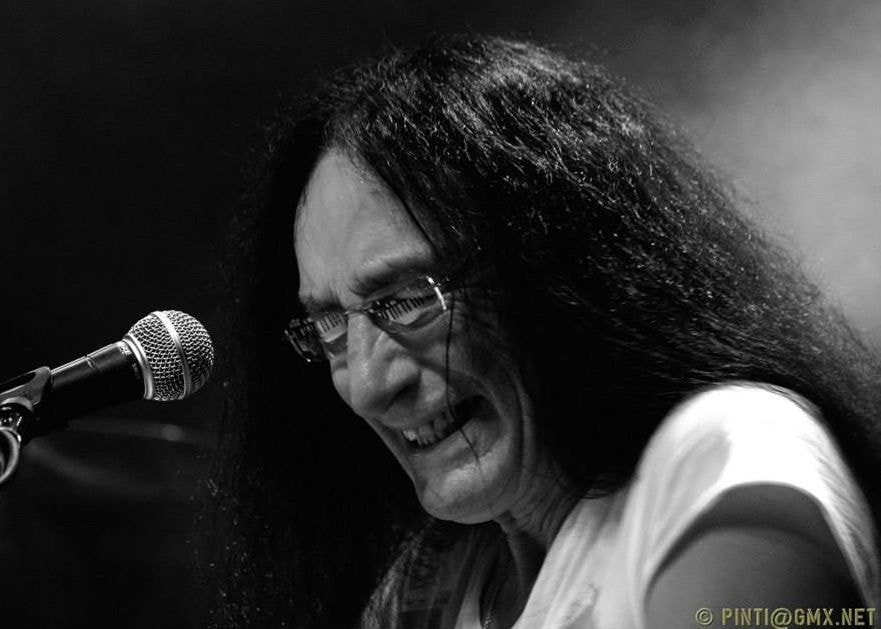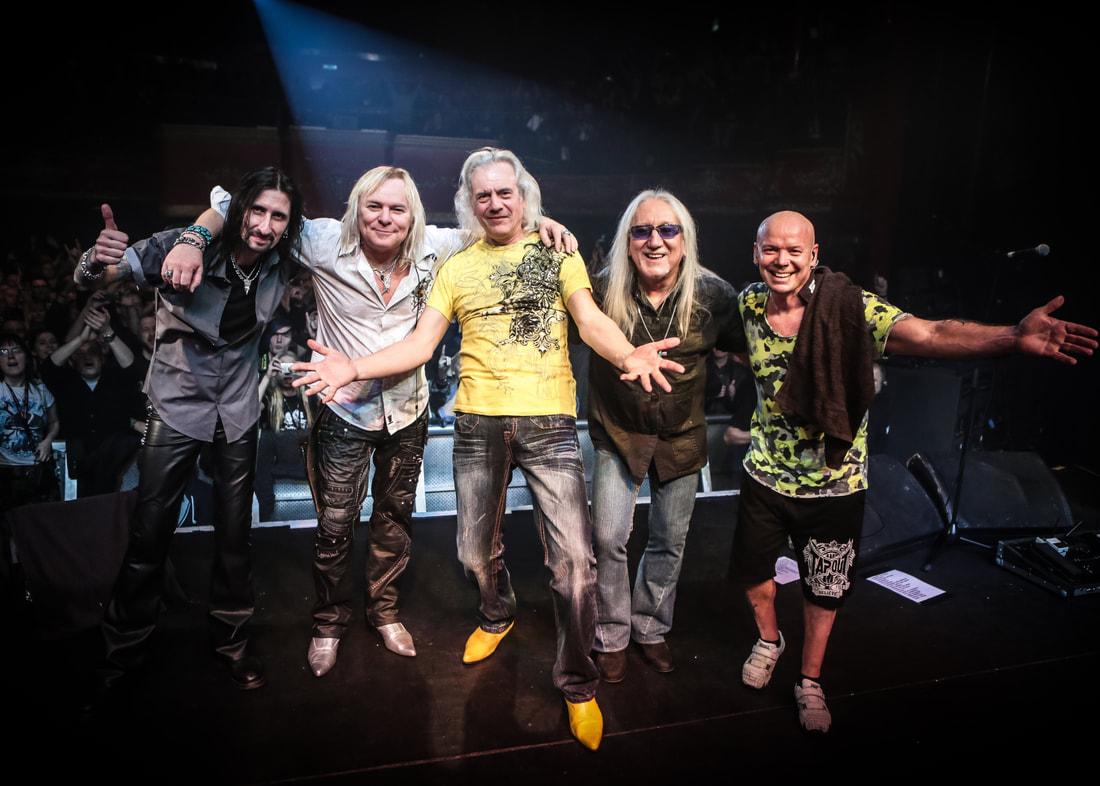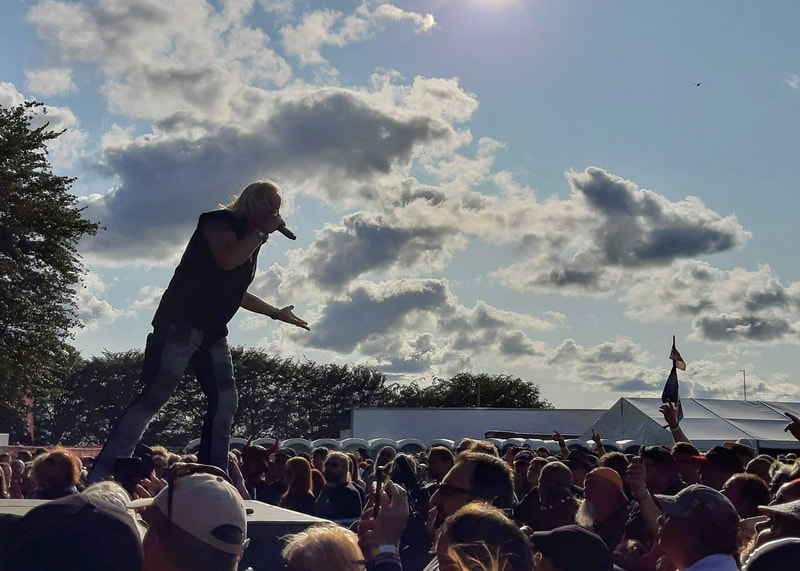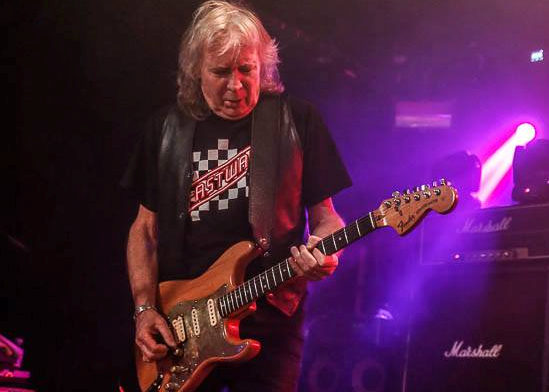|
As an integral part of the original incarnation of Uriah Heep, Ken Hensley's role in the band can not be overstated. As well as being co-responsible for their instantly identifiable sound, the multi-instrumentalist wrote most of the band's biggest tracks, from the immortal 'The Wizard' to the soaring 'Return to Fantasy', and the incomparable ''July Morning'. Celebrating the release of Uriah Heep's career spanning '50 Years in Rock' 23 CD box set, we sat down with Ken for a chat about Heep's rise and fall, and working with Blackie Lawless and W.A.S.P. Wonderworld; Eamon O’Neill.
Hi Ken, how are you today?
I'm jolly good, actually. I'm on my way to lunch with my wife, and it's a sunny day, so I can't complain, actually. Uriah Heep are celebrating five decades with the '50 Years in Rock' set, and although you've been out of the band for quite some time, what's it like for you to look back on that legacy? Well, it seems a little miraculous really, because at the point where the band was beginning to take off, I think people would have been tired of fifty minutes of Uriah Heep, to be perfectly honest with you! But to think about what we achieved together and the things that we did and everything else, it still puts a smile on my face. The period that you were in the band is regarded as the absolute classic Uriah Heep era. You were headlining arenas and selling millions of albums; what was it like during that heyday? Well, to tell you the truth it was all like a mad dream. It's the kind of thing when you're a little kid you dream about happening, and you know, you want to see your name on a billboard somewhere, you want to see your record getting released, you want to see your record in the charts, and then it turns into; "well, maybe one day I might get a gold record", or "maybe one day I'll headline a festival", but in the meantime you'll make do with what you've got, and then when all the other parts of it come true, there's two ways you can react to it; you can either overreact and assume that you've earned it or deserve it, or you can just stand there in awe and wonder and wonder what's fucking next?! And I think we were just all a bit overwhelmed by all of it. It developed relatively fast for you, didn't it? The rock industry in the early '70s was completely overwhelmed because it all developed so quickly. But there was a great sense of camaraderie in those days because everybody pulled together and booked bigger PA systems, and booked bigger venues, and the whole thing just became 'big' because everybody worked together to make it big. You toured with some amazing bands in those early days, including Rush, for example. Yes, Rush opened for us on their first tour of America. What happened was, if you were on the same label or with the same agent, when your first album came out, you went out on the road with one of their bigger acts, as an opening act. This was the way it worked in those days, and that happened with us with Kiss in '73, with Rush, and on our first tour, we went out with Three Dog Night, which meant that we played to sixteen to twenty thousand people every single night; not many bands get that much luck on their first tour of America! Didn't you tour with Rory Gallagher as well? We never toured with Rory, but we did some isolated shows with him, which were amazing. And we actually went into Musicland Studios in Munich [in 1974] to make 'Wonderworld' the same day that he was finishing up an album that also tracked there. And so I got to listen to him play, and to me, he's one of my favourite guitar players in the whole world. Another sad loss. Rory was just so special. Looking at Heep's debut album 'Very 'Eavy, Very 'Umble', you had no writing credits at all; how did you rise to being the band's primary song writer? Well, I can tell you truth now, because I think we're outside the statute of limitations, but when I joined the band I had a publishing contract with another publisher, which meant they had to hide my name. I did, in fact, write songs for the first album, but we just weren't allowed to publicise it, and so it was disguised under Paul Newton's name. The reason I became the dominant writer was because I always wrote a lot of songs. In the days of vinyl, you could only put eight or nine tracks on an album, and I would go in with ten, twelve, fifteen songs, and the other guys would bring maybe one or two, so naturally, that's the way it came out. But the fact that my name doesn't appear on the first album as a writer, it's simply because we took some legal steps to avoid me paying my old publisher. You wrote some amazing tracks with Uriah Heep, including the sublime 'July Morning'. I wrote it, originally, and it's an interesting story, but it's a factual story. I originally wrote the track on a tour bus in the north of England somewhere. We were opening for an American doo wop band called Shalamar, and we were sharing a bus, and we had to sit on the bus and wait for them to finish before we could go home. So it was about one o'clock in the morning, and it was a July morning, and I was bored stiff, and so I just picked up my guitar and started writing about where I was; that's how the song started. And I finished the song without any of the riff embellishments of anything; I finished the song, I took it to the rehearsal room, and as they always did, the band turned it into the song that it became. When it started out, it was an acoustic guitar song, and the band transformed it, wonderfully, into the song that it became, and the song that everybody loves. So it was the band's contributions that transformed it into the powerful epic? It was just one of those things where the band was so great in those days; they would take my simple songs, and they would turn them into band songs. And very often the songs were just simply ballads which I had written; verses, choruses, lyrics and the melody, and by the end of the day in the rehearsal room they'd turned them into Uriah Heep songs. It was such a great and productive relationship, at the time. Another classic was 'Look at Yourself' which soared with David Byron's towering vocal.
Whatever David did was amazing. I mean, he was so wonderful at bringing my songs to life, and by the time we'd done a couple of albums, I was writing virtually for his voice, for his tone. But he interpreted my songs perfectly, whether they were songs like 'Rain' [1972], songs like 'July Morning'; whatever the song was, he would always bring exactly out the best in it. I've never worked with another singer like that, and I really miss David in that respect whenever I'm writing. I miss him tremendously. I was just about to ask whether you missed him professionally, as well as personally. Well, I can honestly say to you that there really were no friendships between me and anybody else in the band. We had nothing in common outside the studio or off the stage. I used to like the motor racing and going to football matches, and so we never really had anything on common outside of our musical relationships. So, I lost David once he became an alcoholic, because he drank so much that he was no longer the great David that I knew. As soon as he became an alcoholic, his focus changed completely, and we we sort of lost contact. It was horrible. I can't explain it to you; it was really an awful thing. I thought maybe it would just pass, to be honest; I thought maybe this will pass in a few weeks, but instead of that it became worse and worse and worse, until we eventually had to fire him, which is something I never imagined we would have to do. It was just so out of my imagination that we would ever fire David. David was part of the band, on stage, on record, on interviews; in every way, so it was unimaginable to me, but he was just at a point with his alcoholism that we just just couldn't work with him anymore. But that's the way it became, and that's the sad truth. And that was after Gary Thain had left the band too. Yes, by that point, Gary had already died, so the quality of the band had fallen apart anyway, and so the whole sad tale was just unravelling before my eyes. I couldn't believe it, and I didn't want to believe it. We went about the situation of trying to replace people, which I quickly found out you can't do. You're talking about the period around the 'Firefly' album in 1977; would it be fair to say that it isn't one of the band's strongest releases? Well, you're absolutely right. If you're familiar with the strongest time of the band, which I think was around 'Look at Yourself, 'Demons and Wizards' - really, that was around the strongest period of the band - if you're familiar with that, and understand the way the band was working then, anything that followed it was really a shadow of what we had done before. It was never quite the same, and it was never going to be the same. It was never as good as it was, as much as we tried to make it the same; it had no chance, no chance at all. It was sad because in a way, it could have been. It so easily could have been bigger and better and bigger and better, but it fell on its ass because of things that need not have made it do that, by which I mean alcohol and drugs. that's what killed it; it didn't just kill the people involved, it killed the band as well. As you say, 'Demons and Wizards' was among the band's high points, as clearly demonstrated on tracks like 'The Wizard'. Well, what was great about that time for me, was that we were so connected, and there was nothing affecting our communication musically, or personally. We'd get to the studio and we were all on the same page, simply, and we were just making magic. Everything we did was so great, and we didn't have to work at it, we didn't have to try hard; everything happened the way it happened. It was like we had reached a pinnacle where we were at out best and at our optimum, and we didn't need to do much of anything to stay there; just keep on a level path, and just keep out focus and our concentration right where it needed to be. And then these outside elements crept in and buggered all that up. Your final album with the band was 1980's 'Conquest'; had you made up your mind by then that it was no longer working for you?
I'll tell you the truth, we had almost a competition in the band on who would replace [previous singer] John Lawton, and the band took the majority position and hired John Sloman against my objections. And I knew he was wrong; somewhere between Gino Vannelli and Stevie Wonder, who desperately wanted to be Robert Plant, was never going to be the right front man for the band. And in the studio when we recorded 'Conquest', I couldn't believe the vocals; it was impossible to get him to sing straight. And so I would moan regularly about it, in the producer's chair, but it didn't make any difference. By then, everybody was so enthralled by this new singer, and the fact that they had beaten me in a competition, and so yes, you're right; by the time we left the studio after making that album I was done. You did do the tour though. I went on the obligatory European tour, which was no fun at all, and then we broke up in, I think Portugal, which was the last show we did. I woke up in my hotel room, and I said; "well that's it; I'm done". Went back to London, called a meeting, and just said; "sorry, but I've had enough". I didn't know what I was going to do, but I knew I didn't want to do that. A few years on from that you made a significant contribution to W.A.S.P.'s 'The Headless Children' album; how did that come about? Well, at the time they had a bass player called Johnny Rod, as he prefers to call himself, and he was from St. Louis, where I was living at the time, and Blackie had made the decision that he wanted to do something different, and Johnny told him about living in St. Louis and me living there, so Blackie asked me if I'd got out to L.A. and work on the new album, and I said I was happy to give it a shot. Of course, I said it depends on the style, because in Blackfoot my style didn't fit at all. But I went out there and we sat in the rehearsal room for a week or so, and rehearsed all the songs. I learned all the songs and Blackie wasn't singing, he was just sort of mumbling melodies. He hadn't finished writing the lyrics, and so by the time we came to go in the studio, I was going a little bit blind because for me, my habit was to play around the lyrics, and play around the melodies, and play around the what the singer was doing, and in this case I had no guidance whatsoever. Even when we got to the studio he still hadn't finished the lyrics. So what did you think when you heard the finished album? Actually the fist time I heard the album was when I flew out to L.A. for the release party, and as soon as I saw this fucking 'decadent generation' shit ['Rebel in the F.D.G'], I just immediately said; "well, you know, I'd really be happy if you just took my name off, because I don't need to be associated with that". I mean, Blackie doesn't need to do that kind of stuff; he's got enough talent without doing that. He told me; "that's just my image, and I'm stuck with it". And so, I was very disappointed, to be perfectly honest with you, because, it was half an album for me because I just had to play without the vocals, and then it was less than half an album for me when it was released. Did the fact that you didn't get to write on it affect your relationship with it? No, no. I had a good relationship with Blackie. He's a very intelligent man, actually, and you could have a really intelligent conversation with the man, and I did. So I wouldn't say it affected our relationship, but I didn't write anything for the album, other than the parts I played on the Hammond, and I wasn't expecting credit for that. I was just disappointed with the overall project because it ran so contrary to everything that I'd always done. You know, we'd never quite stooped to that language. But you know, those kinds of things are much more common, and in many ways I felt a little bit like a dinosaur because; why would you use the ford 'fuck' on an album? I don't understand that. People use that in the streets! You also worked with Cinderella during the '80s. Yeah, I concentrated on that, and Cinderella, and Blackfoot and so on; they were all kind of, trying to see if I still had it, or wanted it. In every case, it fell short; not because of the bands or the music, but because of me - I really didn't know where I was, or what I was, or what I wanted to do. I was just totally lost, and it wasn't their fault, it was totally mine. So, I can't even look at the experience and say that I learned anything from it, because I really didn't. Have you ever desired to get back together with Uriah Heep, or is that something that just doesn't interest you? No. I mean, I did the reunion thing in Moscow with Mick [Box] about five or six years ago [on 15th October 2015 at Moscow Crocus], and I was just doing it for money. That wasn't all together a pleasant experience because I expected it to be like it was in 1975 or '73 or '74, so I was crushed by my own expectations, to be perfectly honest with you. I'm perfectly happy with where I am. I may have played my last show, because the virus has killed every show that I'd planned for this year, and we're unlikely to be able to play next year. But that doesn't bother me either, because I've had such a wonderful life, and so much of my life is way beyond anything I ever dreamed I would achieve, so I can sit back and say it was great, it was fantastic, and just get on with other things. I'm just very peaceful that it happened with where I'm at, and I know that if I got on stage with Heep again, it would just be a facsimile, and I never want to be part of that. You may have played your last show, but have you any studio work in the pipeline? In January I've got a fascinating album coming out on Cherry Red, which is a collaboration between me and a Russian poet, and then later in the year, I finished an album last year with Richard Evans ['A Little Closer'], and that will probably come out in the third quarter of next year. I'm not really sure; we've kept it low profile right now because of the fiftieth anniversary thing, and then because of the other album that will come out at the end of January. But it's really a beautiful record, it'll piss off a lot of purists, but it's a record I've always wanted to make. Uriah Heep's '50 Years in Rock' box set is released on 30th October. To order, click here. For all things Ken Hensley, visit his official site. Like this interview? Like us on Facebook and follow us on Twitter for regular updates & more of the same. |
|
Ken Hensley
"I've had such a wonderful life, and so much is way beyond anything I ever dreamed I would achieve."
© 2016 - 2024 eonmusic.co.ukContact: [email protected]
|




